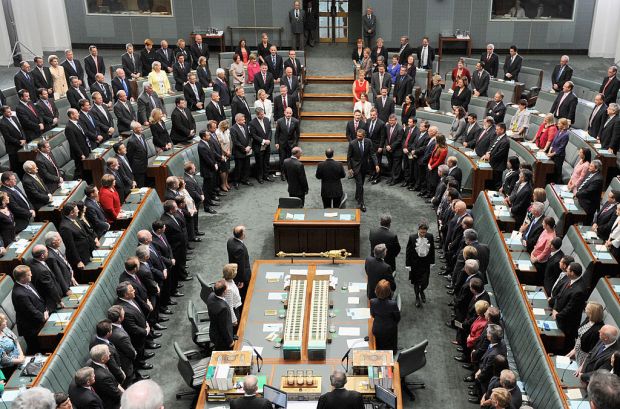The resignation of Professor David Weisbrot from the Australian Press Council was not necessary. This relates to the controversy concerning the appointment of GetUp! deputy chair Ms Carla McGrath to the council as a public member. This was strongly criticised, with some newspapers indicating that they would not take part in the hearing of complaints Ms McGrath was involved. According to newspaper reports, Professor Weisbrot says that the attacks on the appointment were ” thoroughly misconceived.” He says they were based on a misunderstanding that the appointment of a public member is ”within the gift” of the chairman and that he has the authority unilaterally to rescind the appointment. He says that the process had been carried out ”with careful attention to good process” and the ”requirements set down by the council’s constitution.”
The only constitutional restriction on such appointments is that public members must not have ”had previous connections involving ownership of, or employment by, the media (or who the Council considers have not had recent and significant connections of this kind).”
It would not be possible to write down all of the considerations and conventions which apply in such an organisation, or even in public institutions. For example, it is a long-standing practice in the Westminster system – in fact, it is the core principle of the system – that if the government loses the confidence of the lower house, the Prime Minister must resign. And notwithstanding the controversy in 1975, it was well established that where a government cannot provide supply, the Prime Minister should also resign. Neither of these requirements is prescribed in the Constitution. Nevertheless, they are well established, and indeed at the very basis of our system of government. In the United States, it is well established that the President is immune from prosecution while he is in office; this is because of the nature of his office as the third branch of the Constitution and the provision in the Constitution for such matters to be dealt with by way of impeachment by the house and trial by the Senate rather than investigation and trial before a judge and jury. This is not in the Constitution but established opinion is that it flows from the very nature of the office. We can’t write down everything into a Constitution.
Similarly, there are unwritten requirements in any Press Council style adjudication process. One such unwritten requirement flows from what The Times declared in 1851 to be the first duty of the press. This is ”to obtain the earliest and most correct intelligence of the events of the time, and instantly, by disclosing them, to make them the common property of the nation.”
The fact is that in any democracy, a significant part of this intelligence is political. As a consequence, it is perfectly normal that the relations between the press and the politicians will be adversarial, even hostile. The reasons for this are obvious. The politicians will try to ensure that the news presents them in the most favourable light. But the journalists are constantly trying to find out the facts as far as they can, with no assistance from the arms of the state through, for example, subpoenas to produce documents or give evidence. Indeed, if the relationship is not adversarial, then something is wrong. It is reasonable in those circumstances to assume that the press has been captured. If what is reported is not, at least over time, significantly different from the press releases coming from a ministerial office, then something is wrong.
The point is that what appears in the newspaper will often go against the line being maintained by the politicians concerned, including supporting political organisations. Clearly, anyone acting as a judge on any complaint about what has been reported cannot possibly be a politician or political activist. And that is why the press is so outraged by this appointment. In fact, they will never accept it.
I saw this demonstrated when I was chairman of the Press Council and a public member indicated that she would be standing for Parliament but intended to continue at the same time on the Council. The reaction of the Council was unanimous. Neither a politician nor a candidate for public office could remain a public member. No such proscription appears in the Constitution, but everybody understood that the two roles were contradictory. A public member just cannot be a politician or a political activist. This would apply equally were the activist be related to a Conservative political party. At the same time it has to be acknowledged that given what has happened to other institutions in our society, conservatives are no doubt fearful that this appointment is yet another manifestation of the infamous long march by the extreme left or hard left or through the institutions.
In any event, it was not necessary for David Weisbrot to resign. What is necessary is for the Council to correct its manifest error in making this appointment, presumably on the chairman’s nomination. It is curious that stronger resistance to this not made at the time, but to expect an organisation to operate without making mistakes is unrealistic. The Press Council no doubt now understands the important convention which proscribes the appointment of politicians, political candidates and political activists.
If I were to be asked where do you draw the line between, for example, mere membership of a political party and these prescribed areas, the only answer is in applying common sense.
Emeritus Professor David Flint was the longest serving Chairman of the Australian Press Council, and the only one to be appointed from its membership.
Got something to add? Join the discussion and comment below.
Got something to add? Join the discussion and comment below.
Get 10 issues for just $10
Subscribe to The Spectator Australia today for the next 10 magazine issues, plus full online access, for just $10.


























Comments
Don't miss out
Join the conversation with other Spectator Australia readers. Subscribe to leave a comment.
SUBSCRIBEAlready a subscriber? Log in